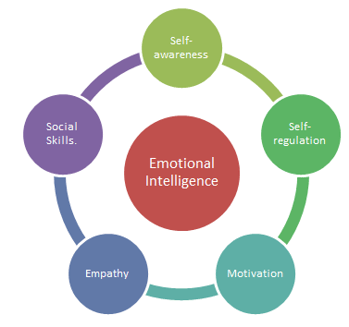When most people think about intelligence, they focus on whether an individual is smart. This type of intelligence is known as IQ. Does the person have the ability to learn and apply their knowledge and skills? No one can deny that intellect is incredibly important in the workplace. But, there are other types of intelligence that are equally or even more critical. Let’s be honest, you can be the smartest person in the room but if you can’t relate to others, work with people who are different than you, or communicate your ideas, everyone will struggle.
One particular type of intelligence that has been getting a lot of press recently is emotional intelligence, commonly known as EQ. EQ is the ability to recognize and understand your emotions and the emotions of others. Emotions and intelligence used to be thought of as opposites. However, the way emotions and intelligence work together has become a major area of interest, especially when it comes to the workplace. The recognition of the role EQ plays in our daily interactions is driven from the top of our leadership team and supported at every level of the organization. In this week’s “Meet the FACE of ACE,” we learn from ACE’s CEO, Chuck Biehn about emotional intelligence and what it means to ACE.
The inability or unwillingness to recognize and manage emotions, can cause major disruptions in the workplace. There was a time when employees were counseled to leave their emotions at the door when entering their job. More forward thinking organizations realize the employees are humans with real feelings and emotions that are impossible to leave behind when they clock in for the day.
At American Cutting Edge, we understand that when people are able to appropriately recognize and manage emotions on the job, there’s more opportunity for collaboration among teams. This creates a healthier and happier environment for everyone. The work environment and way people interact on the job is referred to as company culture. In today’s society, company culture is an aspect that weighs heavily in the decision making process when potential candidates consider an employment offer.
There are five parts of emotional intelligence, which are listed below. The great thing about EQ is that it’s a skill you can continue to develop over time. As Chuck mentions during our discussion, we’re all humans who are works in progress. No one is ever done learning about themselves and how they can improve their communication and interpersonal skills.
it’s a skill you can continue to develop over time. As Chuck mentions during our discussion, we’re all humans who are works in progress. No one is ever done learning about themselves and how they can improve their communication and interpersonal skills.
- Self-Awareness – Be aware of your limitations, where you need to improve, and how you appear to others. Sometimes it’s easy to come across as angry or irritated when you’re not. Knowing how you’re being perceived when you communicate can go a long way in helping you improve your style and approach.
- Self –Regulation – Self-regulation boils down to being able to manage your emotions and control your approach or response. If you know you’re emotionally charged about a situation, you have to be able to keep yourself from being unnecessarily direct or harsh when address the problem. As you become more aware of how you’re perceived by others, it’s important to be able to modify your approach so communication is more readily received and people can work as a team.
- Empathy – People who are empathetic understand the emotions of other people. Being able to see a situation from someone else’s viewpoint. In the workplace, the proper level of empathy can apply to everything from cross-cultural differences to the ability to retain top talent, recruit new employees, and the ability to help develop people.
- Social Skills – The ability to build and manage relationships are a critical component of EQ. Being able to translate ideas, build trust, and engage across an organization provides an opportunity for collaboration, effective conflict resolution amongst team members, and a sense of belonging.
- Motivation – Highly motivated and emotionally intelligent people are dedicated to their roles, eager to be successful, and work with more passion. In an environment where they’re able to openly express their thoughts, contribute ideas, and are appreciated for their contributions, employees are more likely to improve themselves and the organization as a whole.
“At American Cutting Edge, one of our core values is to learn, be curious, and share. The idea of more intrinsic values where people focus on how they can contribute to the organization by improving their skills and knowledge helps the entire team grow. Our people understand that if they advance their understanding, the entire team benefits and thrives,” shared Chuck Biehn. “Everyone has room for improvement. It’s part of the human condition. No one is perfect. When we recognize, understand, and embrace our differences, we find ourselves on the path to greater personal and organizational development,” he adds.
What's Your EQ?
How do you know if you’re emotionally intelligent or not? There are many different assessments available to help gauge EQ. Some through counseling or executive coaching firms can cost money. Here’s a link to a quick, free, self-assessment that might serve as an indicator of EQ. One of the best ways to determine how you’re being perceived and whether you’re managing your emotions is to take yourself out of assessment and ask for honest feedback from your peers and teammates.
Come grow with us! Check out our open positions and apply today!




